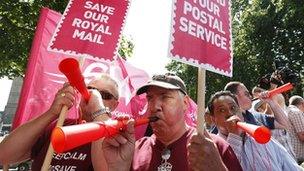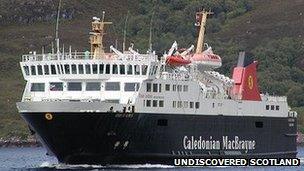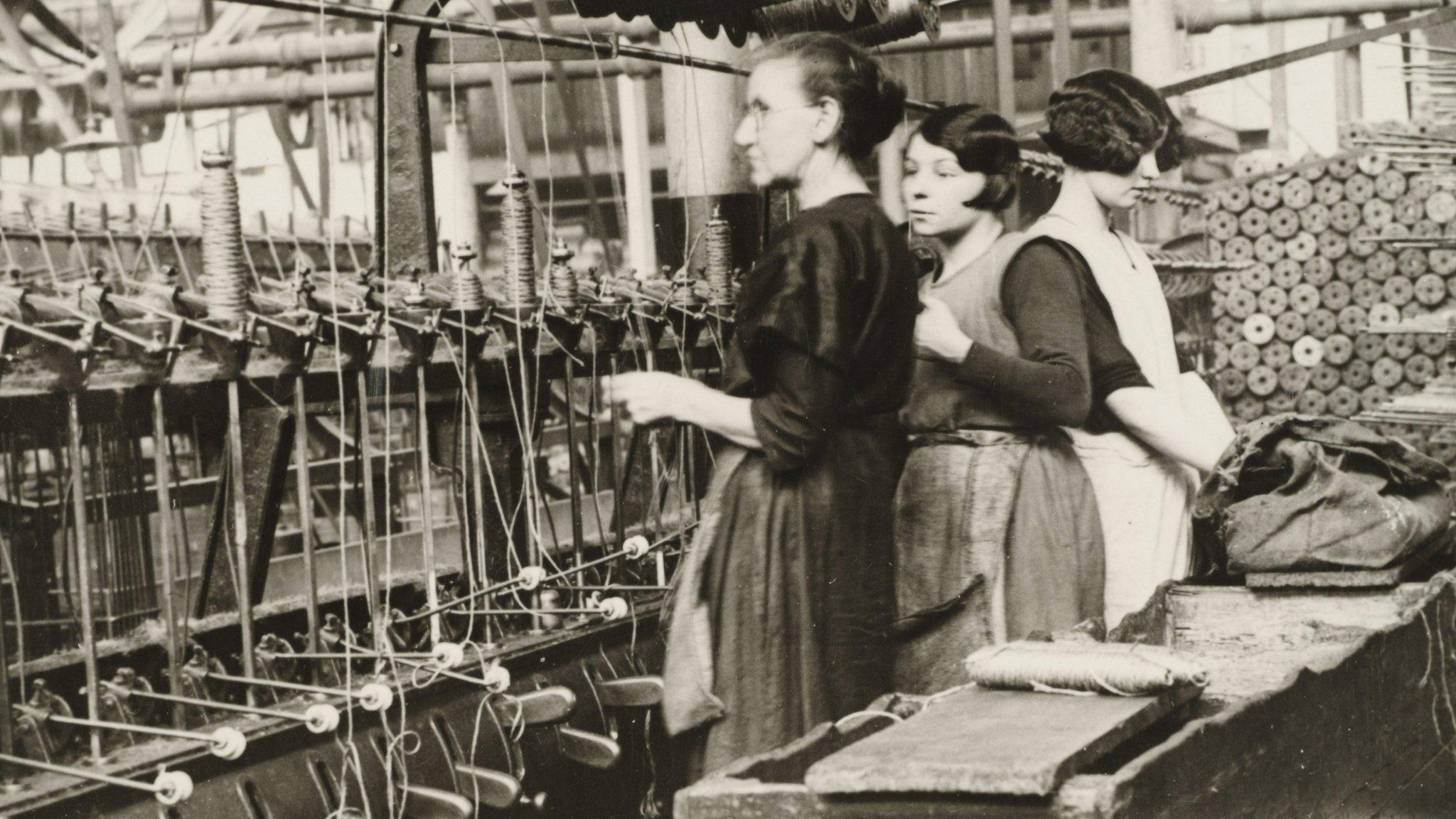Does private ownership always beat public?
- Published

The government has opted to float Royal Mail on the London Stock Exchange
There's a nostalgic air to business and politics these days.
In his conflict with the Labour leadership, Unite the union's boss evokes the barons' clout in the 1970s.
And with Royal Mail, we're back to the big privatisations of the 1980s.
Put the two together, and you find the Communication Workers Union challenge to the UK government's plans to put Royal Mail shares on the London Stock Exchange.
What we know better now is how well privatisation works. So as Royal Mail heads for its sale, what can we conclude?
Thatcher sell-offs
There are different stories to tell about Britain's privatisation. Some industries were sold off in order to be run down. They were deemed to be in decline and inefficient while making large losses. That's why the Thatcher government got British Steel, British Shipbuilders, British Leyland cars and the National Coal Board off its hands.
The legacy of that is still coming back to us. Scotland's two biggest private coal companies have recently collapsed because their opencast operations can't compete with imports. Nor, it seems, can the bonds lodged by the private sector pay for restoration of those coalfields.
The biggest operator in England has only survived this week by making hundreds redundant and by getting the Pension Protection Fund to take on its pension obligations.
Britain's steel industry is now much leaner and more focussed on niche markets, much of it controlled from India, and vulnerable to fluctuations in the world price for steel.

The Communication Workers Union opposes the privatisation plan
The English car industry has been transformed, through the arrival of Asian-based manufacturers, and, more recently, through German ownership and the rebuilding of Jaguar Land Rover under Indian ownership.
There were government shareholdings in companies which were not declining, but in which the 1980s Thatcher government saw no need to hold a stake.
One was British Airways. Another was BP. There was a decision to put all Britain's North Sea stake into private hands, including BP and the wholly government-owned British National Oil Corporation.
Now, you could argue, as they did then, that the state has no place in the global oil industry. But in light of Norway's highly successful handling of its North Sea interests through Statoil, you could argue to the contrary - that Britain missed a huge opportunity. The big sovereign oil corporations are becoming the mighty players in the industry, even if they're much less efficient than private players in their use of resources.
Unhealthy dependence
Several defence interests were sold. But with BAE Systems inheriting much of the manufacturing, including the Clyde shipyards, we now have a government and a huge corporation which have an unhealthy dependence on each other.
Putting utilities into the private sector was partly the same justification given this week for Royal Mail's sell-off: the markets give the company access to necessary private capital, which the public sector cannot provide (or to put it another way, which the Treasury is unwilling to provide).
That went for telecoms too. British Telecom, now BT, had been part of the Post Office, and was sold off at the start of a massive change in telecom technology. It's no longer normal to wait months to get a phone installed, as used to be the case. But the private sector is not short of criticism for its customer service.
The technology changes continue, and private funding can be accessed for that. But as we learned earlier this week, state subsidy from the EU, UK, Holyrood and local councils has to be far greater than BT's investment to ensure fibre cabling for more than 600,000 Scottish customers whom a pure market model won't reach. There wasn't much sign of competition in this market: BT was the only private player able or willing to deliver the goods.
The energy utilities have increasing bills, through rising fuel costs and government-imposed green and social targets. But amid accusations that there's a lack of proper competition between them, they're hardly the poster boys for free enterprise these days.
And in efforts to make markets work in gas, electricity and telecoms, it has required the growth of a huge industry in regulation. It's only with Ofcom regulation of Royal Mail services, to police the requirements on it of a country-wide service of regular collections and deliveries, that its privatisation is being allowed.

CalMac is a government-owned success story
The water industry is part of that story too. But note this is one industry in which most of it was privatised, and one bit was not. So it's an interesting test case for the public versus private debate.
Keeping the Scottish water industry in public hands was a response to political and public hostility in Scotland to Tory ministers' suggestions that the industry might be, at least partly, put into private hands. For the SNP government, that taboo remains in place.
Now amalgamated from council control, to three regional boards, to one national company, Scottish Water has set about proving that public ownership can match the private variety.
Its path to resolving a backlog of infrastructure repairs has not run to the same schedule as that of the English companies. But it's now reached a stage where it can at least match the privately-run, foreign-owned English companies for service levels, customer satisfaction and (regulated) price.
And unlike England, Scottish Water's subsidiary, Business Stream, has been exposed to competition for non-residential custom. Claiming to have saved its customers millions of pounds, while facing little competition from challengers coming into the market, Business Stream is itching to get into the English market for supplying water and sewerage services to business.
The continuing controversy about Scottish Water is not about the public sector's capacity to run it well or efficiently, or to meet customer requirements. It's about the chunk it has taken most years from the Scottish government's capital allocation. That's been money that hasn't been available for other capital projects. And that's why opposition parties at Holyrood want to see it shifted at least towards mutual status.
Off the rails
Where the argument is more often applied about market failure is in the running of Britain's railways.
Much of that story has been about the use of subsidy and the complexity of vast contracts. Shifting the rail infrastructure into private hands failed horribly, with private Railtrack later transformed into the publicly-owned Network Rail.
The operators have a mixed record. On the East Coast line, they've twice failed to make good on their contracts, and have had to hand the franchise back into public hands. In recent years, the government-owned train service between Aberdeen, Inverness, Edinburgh and London King's Cross, has delivered more than £600m of profits to the Treasury.
That's why there's a campaign to continue the public ownership of the East Coast franchise. And there's pressure in Scotland to do the same with internal Scottish rail services, after First ScotRail's franchise comes to an end.
Franchise flux
That also helps explain why the rail operators on Wednesday published fresh research, offering evidence of how good they have been for rail services in Britain.
There's little mention of the East Coast precedent, and there's an acknowledgement that the growth in passenger numbers can also be explained by economic growth and the avoidance of rising road congestion.
But they want to make sure that the flux in which the franchising system finds itself - due to Whitehall's botching of the West Coast franchise - doesn't put their future business at risk.
In the report, Tim O'Toole, of the rail operators and chief executive of First Group, responds to criticism of the franchise model by stressing that "our next stage of development will ensure that the interests of passengers, and not contractual relations, drive everything we do".
"Government has devised a winning formula where competition injects new ideas and skills to enhance services, attract more passengers and keep costs down," says the train operators's report. "It is a model that will deliver further improvements in rail services and that other countries are keen to learn from and emulate".
Those other countries? The Czech Republic, Denmark, Germany, the Netherlands, Poland, the US and Australia.
Nationalised stigma
So although nationalised corporations appear to be a throwback to the 1970s, privatised industry is still having to make the case for the market.
Following the grand privatisations of the 1980s, services providing by nationalised corporations don't carry the same stigma and expectation of low service that was once the case. Some have shown that public can also deliver.
The point was brought home to me at the recent Scottish Business Awards dinner in Edinburgh. After Bill Clinton had his say, the trophy for customer focus did not go to short-listed Arnold Clark, BSkyB, Schuh shoes or Scottish Gas.
It went instead to Caledonian MacBrayne. Wholly owned by the Scottish government, it was recently also named transport operator of the year. Hebrideans have grown over the years to love the lifeline ferry firm, even if it's sometimes a bit grudging.
- Published7 July 2013
